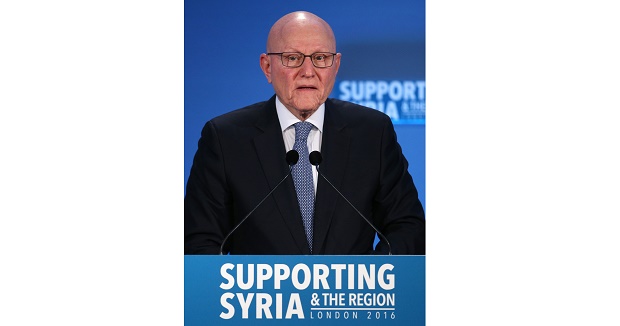Lebanon’s PM calls on Riyadh to reconsider halting aid to army

Lebanese Prime Minister Tammam Salam speaks at the ‘Supporting Syria and the Region’ conference at the Queen Elizabeth II Conference Centre in London, Thursday, Feb. 4, 2016. Leaders and diplomats from 70 countries are meeting in London Thursday to pledge billions to help millions of Syrians displaced by war, and try to slow the chaotic exodus of refugees to Europe. Dan Kitwood Pool via AP
BEIRUT, Lebanon—Lebanon’s prime minister on Friday urged Saudi Arabia to reconsider a decision to suspend $3 billion in military aid in protest against Hezbollah, the Shiite militant group supporting Syria’s regime.
“We were very sad to hear the Saudi kingdom’s surprising decision to halt aid to the army and the internal security forces,” Tammam Salam said in a statement, adding he hoped for “the review of the decision.”
Riyadh earlier on Friday also said that the remainder of a $1 billion financing package for Lebanese internal security forces had been stopped, in a separate decision.
READ: UN experts: Up to 3,000 Islamic State fighters in Libya
Hezbollah, backed by Saudi Arabia’s regional rival Iran, on Friday said the decision came as no surprise and was linked to Riyadh’s financial crisis.
Article continues after this advertisement“Saudi Arabia is suffering a severe financial crisis” which Hezbollah said was linked to “the huge cost of its sinful aggression on brotherly Yemen” and the collapse in global oil prices.
Article continues after this advertisementRiyadh leads a military coalition that has conducted air strikes and ground operations against Iran-backed Shiite Huthi rebels in Yemen since last March.
Last December, Saudi Arabia also formed a new 35-member coalition to fight “terrorism” in Islamic countries.
READ: Saudi Arabia forms Islamic counterterrorism coalition
“The Saudi decision reveals once again the falsity of its claims in the fight against terrorism… and confirms its real position is that of sponsoring, arming and financing terrorism,” Hezbollah said.
Sunni former premier Saad Hariri, who is supported by Saudi Arabia and the West, said Lebanese “received with feelings of regret and worry” the Saudi decision, but it was understandable as a response “to Lebanon’s rash decisions to exit from the Arab consensus.”
Oil-dependent Saudi Arabia has imposed unprecedented cuts in its 2016 budget after a drastic fall in global crude prices, which have dropped from above $100 a barrel in early 2014 to below $34 a barrel on Friday.